Elche
Elche (/ˈɛltʃeɪ/,[2] Spanish: [ˈeltʃe]) or Elx (UK: /ɛltʃ/,[3] US: /eɪlʃ/,[4] Valencian: [ˈɛʎtʃ])[lower-alpha 1] is a town and municipality of Spain, belonging to the province of Alicante, in the Valencian Community. According to 2014 data, Elche has a population of 228,647 inhabitants,[5] making it the third most populated municipality in the region (after Valencia and Alicante) and the 20th largest Spanish municipality. It is part of the comarca of Baix Vinalopó.
Elche Elche / Elx | |
|---|---|
Altamira Castle and panoramic view of Elche | |
 Flag  Coat of arms | |
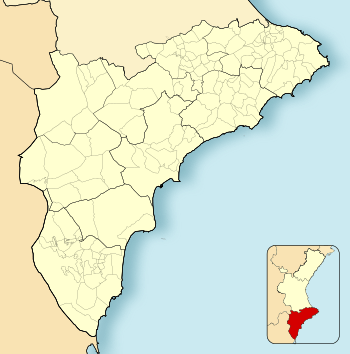 Elche Location in the Province of Alicante 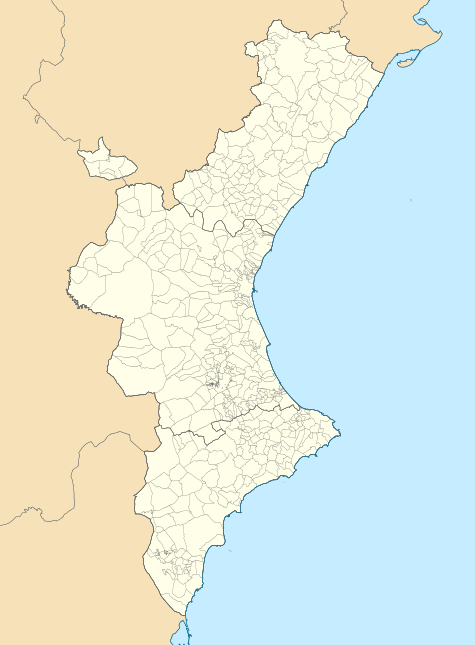 Elche Location in the Valencian Community 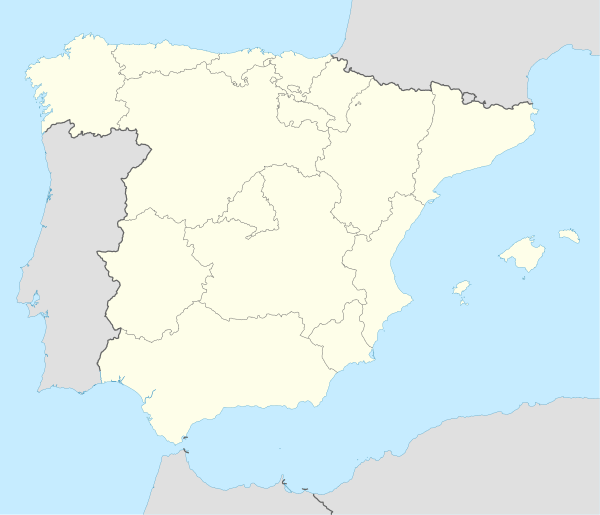 Elche Location in Spain | |
| Coordinates: 38°16′1″N 0°41′54″W | |
| Country | |
| Autonomous community | |
| Province | Alacant |
| Comarca | Baix Vinalopó |
| Judicial district | Elx |
| Founded | Iberian settlement; 5th century BC |
| Government | |
| • Alcalde (Mayor) | Carlos González Serna (2015) (PSPV-PSOE) |
| Area | |
| • Total | 326.10 km2 (125.91 sq mi) |
| Elevation | 86 m (282 ft) |
| Population (2018)[1] | |
| • Total | 230,625 |
| • Density | 710/km2 (1,800/sq mi) |
| Demonym(s) | Ilicitano, ilicitana |
| Time zone | UTC+1 (CET) |
| • Summer (DST) | UTC+2 (CEST) |
| Postal code | 03200-03299 |
| Dialing code | 966 - 965 |
| Official language(s) | Spanish and Valencian |
| Website | Official Website Official tourism Website |
Part of the municipality is coastal yet the city proper is roughly 11 km (6.8 mi) away from the Mediterranean Sea. A small creek called Vinalopó flows through the city.
Elche is so close to the city of Alicante that both cities form a de facto conurbation of some 800,000 inhabitants.
The city is noted by its urban Palm Grove, designated as World Heritage Site.
History
La Alcudia is 10 km from the current city's location and the immediate predecessor of current day Elche. This original location was settled by the Greeks and then occupied by Carthaginians and Romans. Greeks Ionian colonists from the Achaean city Helike established their new colony, naming it Helíkē (Greek: Ἑλίκη) around 600 BC. It was a point of resistance against Carthaginian advance in Spain between the First and Second Punic Wars.[6] The Romans called the city Ilici or Illice and granted it the status of colonia; after a brief Byzantine rule, the Goths took over, establishing an episcopal see.
_Jean_Laurent.jpg)
Elche lost importance during the period of Moorish occupation, when it was moved slightly north to its present location. James II of Aragon took the city from the Moors in the 13th century, during the Reconquista. The city grew throughout the 18th century and became more important during the 19th century with the arrival of the railway and a booming industrial development of what used to be the traditional footwear industry.
Many archaeological remains have been found in Elche, with the stone bust of the Lady of Elche (Dama de Elche/Dama d'Elx in Spanish and Valencian (or Catalan), respectively) being the most important. This may date from the Iberian period (4th century BC). The original is in the National Archaeological Museum of Spain.
Economy
The economy of Elche is based, in large part, on the footwear industry, with over 1,000 shoe factories, being one of the most important footwear centres in Spain and the rest of Europe with brands like Pura Lopez or Panama Jack. There are other economic activities in Elche: agriculture (dates, olives, cereals and pomegranates), although it has lost importance in recent years; rubber industry; trade, which employs 20% of the workforce; and tourism.
Elche has a conference centre (called Ciutat d'Elx), an international airport (Aeropuerto de Alicante) a public University, Universidad Miguel Hernández, and a private University, Universidad CEU Cardenal Herrera.
Climate
Elche has a hot subtropical semi-arid climate (Köppen climate classification BSh).
| Climate data for Elche | |||||||||||||
|---|---|---|---|---|---|---|---|---|---|---|---|---|---|
| Month | Jan | Feb | Mar | Apr | May | Jun | Jul | Aug | Sep | Oct | Nov | Dec | Year |
| Average high °C (°F) | 17 (63) |
18 (64) |
20 (68) |
23 (73) |
26 (79) |
30 (86) |
33 (91) |
33 (91) |
29 (84) |
26 (79) |
22 (72) |
18 (64) |
25 (76) |
| Average low °C (°F) | 5 (41) |
6 (43) |
8 (46) |
11 (52) |
14 (57) |
18 (64) |
22 (72) |
22 (72) |
19 (66) |
15 (59) |
11 (52) |
6 (43) |
13 (56) |
| Average rainfall mm (inches) | 20 (0.8) |
19 (0.7) |
22 (0.9) |
26 (1.0) |
24 (0.9) |
5 (0.2) |
1 (0.0) |
1 (0.0) |
14 (0.6) |
22 (0.9) |
28 (1.1) |
20 (0.8) |
202 (7.9) |
| Average rainy days (≥ 1.0 mm) | 4 | 3 | 4 | 4 | 3 | 1 | 0 | 1 | 2 | 3 | 4 | 3 | 32 |
| Source: Meteoblue[7] | |||||||||||||
Main sights
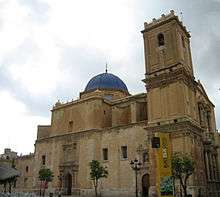
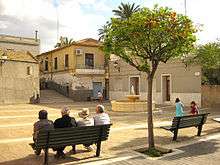
- Palmeral of Elche ("The Palm Grove of Elche", Palmerar d'Elx in Valencian (or Catalan)). It is an orchard of over 200,000 palm trees that was declared a World Heritage Site by UNESCO in 2000.
- Altamira Castle, also known as Alcázar de la Señoría, located next to the Municipal Park (which, in turn, is a part of the Elche Palm Grove) It was originally built in Almohad times (12th-13th centuries), and was later renovated with brick exterior in the 15th century. A former fortress, in 1913 it became a fabric plant, it has also been used as the town hall and as a prison during the Spanish Civil War, while today is home to the Elche Archaeology and History Museum
- Baños Arabes (Arabic Baths), which re-uses old Roman baths.
- Basilica of Santa Maria
- Calahorra Tower, of rectangular plan and Rabic origin, it represent the last relic of the old city walls.
- Municipio (Town Hall)
- Convento de la Merced
- Huerto del Cura
- Elche Palaeontological Museum
- Elche Municipal Festa Museum
- Palm Groves Museum
The Mystery Play of Elx (better known as Misteri d'Elx, in Valencian (or Catalan)) is a sacral-lyrical medieval drama, dated from the 15th century, which was declared a Masterpiece of the Oral and Intangible Heritage of Humanity by UNESCO in 2002. It is played every year in mid August, in the context of the local holidays dedicated to the Assumption of Virgin Mary. Also as a part of this celebration, on the 13th of August is the date of a celebration in Elche called Nit de l'Albà (Night of the Dawn) in which a citywide night-long show of fireworks takes place.
Transport
The Alicante–Elche Airport, the fifth-busiest in Spain is located in the municipality of Elche, around 10 kilometres (6.2 miles) east from the city centre. The Autopista AP-7 serves the outskirts of the city, and the railway linking Alicante and Murcia del Carmen runs through a tunnel underneath the city, with two underground stations; Elche-Parque (Valencian: Elx-Parc) and Elche-Carrús (Valencian: Elx-Carrús).[8] These are served by line C–1 of the Cercanías Murcia/Alicante commuter rail service, along with Media Distancia trains between Valencia Nord station and Murcia.
The Madrid–Levante high-speed rail network is being extended to reach a new station named Elche-Matola, branching off from the line to Alicante near Monforte del Cid. The new AVE station will contain parking space for 500 cars and 50 motorcycles.[9]
Notable people
- Marceliano Coquillat, architect
- Saúl Ñíguez
- Aarón Ñíguez
- Silvia Soler Espinosa
- Francisco Mojica, a microbiologist noted for his research on the CRISPR gene editing technique
Twin towns
- Toulouse, France (since 1981)[10]
- San Bartolomé de Tirajana, Spain (since 1982)[11]
- Jaca, Spain (since 1984)[12]
Notes
- Both names are official as Elx/Elche.
References
- Municipal Register of Spain 2018. National Statistics Institute.
- "Elche" (US) and "Elche". Oxford Dictionaries UK Dictionary. Oxford University Press. Retrieved 19 May 2019.
- "Elx". Collins English Dictionary. HarperCollins. Retrieved 19 May 2019.
- "Elche". Merriam-Webster Dictionary. Retrieved 19 May 2019.
- Elche supera ya los 228.300 habitantes, INFORMACION.es, December 31, 2008, Editorial Prensa Ibérica
- "Roman Policy in Spain", Harvard Studies in Classical Philology, p. 209.
- "Climate Elche".
- "El túnel que cambió Elche". Diario Información (in Spanish). 14 October 2018. Retrieved 3 April 2020.
- "Dos horas y media de Elche a Madrid, en AVE". Diario Información (in Spanish). 4 February 2019. Retrieved 29 August 2019.
- "Jumelages". Mairie de Toulouse.
- "La tristeza de una fuente seca". Canarias7. 8 May 2017.
- "Jaca y Elche consolidan su compromiso de colaboración" (PDF). El Pirineo Aragonés (6472): 1. 11 September 2009.
External links
| Wikimedia Commons has media related to Elche. |
| Wikivoyage has a travel guide for Elche. |
- Tour virtual 360° por la ciudad de Elche (in Spanish)
- Economical and social information about the city 2007 (in English)
- Ajuntament d'Elx, Town Hall of Elche (in Catalan and Spanish)
- Instituto Valenciano de Estadística City official statistics.
- Turisme d'Elx, City council official Tourist guide (in English, Catalan, and Spanish)
- Elche, City overview from a local citizen (in English)
- Cultura d'Elx, City council Cultural events website (in Catalan and Spanish)
- FuturElx, City council strategical development guidelines (in Spanish)
- The first ever Elche Home Page (in English)
- Miguel Hernandez University of Elche (in Catalan and Spanish)
- BBC Radio 3 programme on Mystery Play - available to listen online 14-21 October 2006 (in English)
- Festival of street arts Elx al Carrer (in Spanish)
- Museums of Elche (in Spanish)